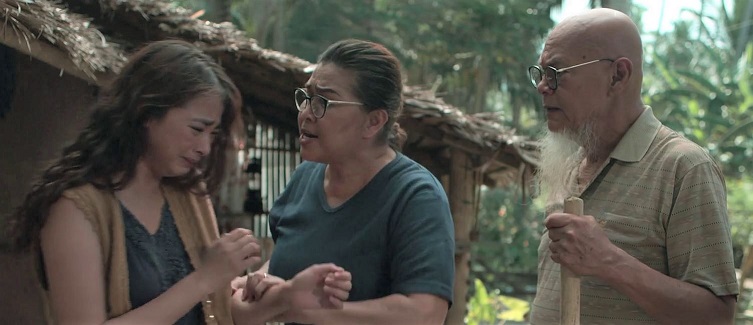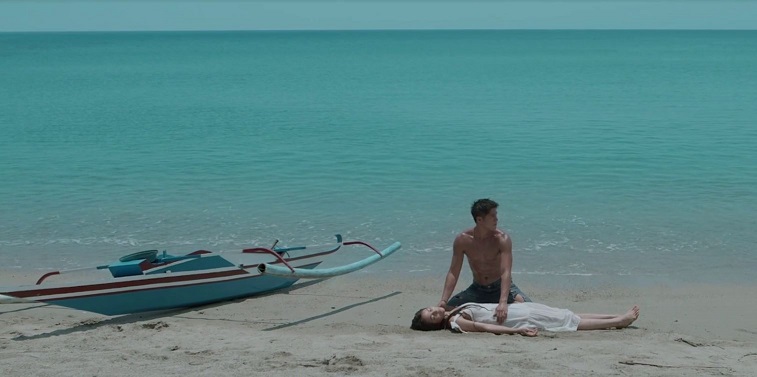In ‘Nerisa,’ Viva brings back Regal’s low-budget blockbuster formula

By Joel David
Among the Philippines’s media-streaming participants, Viva Films has resumed its early role as determined new player, the same way it set out to challenge the then-nearly monolithic Regal Films when it first emerged during the 1980s. This time, however, it also seems to be partaking of the innovations that Regal once became known (or notorious) for, including its reliance on genres considered commercial (“low” to the local critical elite) and on bare-bones budgeting. With a currently streaming release, Nerisa (available via Vivamax and other services), it has finally struck gold, the same way that Regal regularly did during its time. Shot on a quickie schedule, the project intercepted a young filmmaker, Lawrence Fajardo, on his way to upgrading his fluency in the medium while extending his grasp to material he had not yet attempted.
Fajardo’s qualitative shift in directorial expertise was affirmed when his previous project, Kintsugi, shared last year’s Young Critics Circle top prize. Fajardo started out by specializing in the multicharacter-film format, a challenge that only a select number of filmmakers accepted with any regularity, including Ishmael Bernal, the country’s undisputed master of the form. With Imbisibol, an earlier film set in the northernmost (and therefore coldest) Japanese island of Hokkaido, he depicted the lives of undocumented Pinoy migrants beset by financial and immigration troubles, and attained a personal best.
Nerisa benefits immensely from the narrative treatment shaped by Ricky Lee, who has apparently reworked his 1981 script for Laurice Guillen’s Salome, in its focus on the plight of an outcast couple in a coastal village. Since it follows a linear trajectory rather than the recollections in Salome of a crime of passion from the perspectives of several participants, Nerisa enables its characters to position themselves in the violence-prone class and gender dynamics that a patriarchal order imposes on its citizens; it further qualifies the proceedings by articulating (via radio commentaries) the global concerns of our fisherfolk confronted by Chinese vessels overstepping their territorial boundaries and plundering Philippine waters. Obet, the title character’s husband, badgers his peers to venture beyond municipal fishing grounds in order to be able to purchase his own boat and stop relying on the preferences of boat-owning artisans.

As in Salome, the couple live beyond the pale of their town’s quotidian concerns. Obet was an orphan raised by a childless couple, and his stepsister Lilet (an abandoned child being raised by the same couple) narrates Nerisa’s tale. Nerisa herself was a foundling rescued by Obet from drowning, whose beauty is enhanced by her faithfulness to her savior; understandably the men who learn about her develop a fairly strong carnal interest in her, while their wives suspect her of bringing to their island the curse of a seductive yet dangerous mermaid. She finds sister-like refuge in the town’s other outcast women – Joni, the independent-minded loner who dares to dispense with her body according to whatever advantage it might bring her, and the aforementioned Lilet.
When Obet disappears during a fishing expedition, the trio set out to ask help from Coast Guard officials. The townsfolk thereafter initiate a round of malicious gossip whose outcome anyone familiar with social media can expect to end dismally for everyone involved. Upon his return, Obet gets caught up in the cycle of negativity and works out a form of punishment premised on the kind of homosocial interaction originally described by the late queer feminist Eve Kosofsky Sedgwick in Between Men, where same-sex male bonding is facilitated by the use of women as objects of exchange.

Fajardo’s expertise in handling these admittedly distressing developments lies in his ability to render passion as a crucial element of survival. Obet’s original intent to punish Nerisa via marital rape is misperceived by her as an expression of his ardor. The other menfolk’s savagery is infused with the anxiety they feel because of the depletion of natural resources that they once took for granted. Yet Fajardo also makes clear whose side he champions: in failing to see how the women in their lives are twice victimized – by the forces of uneven global development as well as by patriarchal ideology – they set themselves up for an ironically satisfying bloody retribution.
Nerisa’s brand of cautionary feminism may be yesterday’s news to today’s enlightened viewers, but I would argue that its delineation of a more conflicted mentality among villainous characters, as well as its upholding of women’s solidarity premised on their bodily prerogatives, ought to serve as templates for future rural-set sex melodramas. In addition to these revelations, Fajardo deploys a disciplined minimalism that only the ornery would ascribe to the limited resources he had to work with.
There’s a breakout lead performance in Cindy Miranda reminiscent of an earlier beauty queen-turned-actor, Elizabeth Oropesa, who plays Obet’s adoptive mother, as overprotective of him as she behaves abusively toward his half-sister (another feminist insight into mothering from an essential circle of authors starting with Jessica Benjamin). I also never imagined a time when Aljur Abrenica would be able to command a film screen with any authority, but if our cinema ever runs out of talent to celebrate, that would be the definite indicator that our surrender to forces beyond our control has been completed.
Joel David is a Professor of Cultural Studies at Inha University and was founding director of the University of the Philippines Film Institute. He was given the Art Nurturing Prize at the 2016 FACINE International Film Festival in San Francisco and is this year’s recipient of the Writers Union of the Philippines’ Balagtas Award for Film Criticism. He has written several books on Philippine cinema, with his latest, a short manual titled ‘Writing Pinas Film Commentary,’ available for free on his blog at https://amauteurish.com/books.


(C) The FilAm 2021











